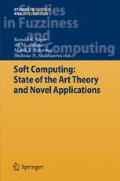Abstract
Fuzzy Set Qualitative Comparative Analysis (fsQCA) is a methodology for obtaining linguistic summarizations from data that are associated with cases. It was developed by the eminent social scientist Prof. Charles C. Ragin, but has, as of this date, not been applied by engineers or computer scientists. Unlike more quantitative methods that are based on correlation, fsQCA seeks to establish logical connections between combinations of causal conditions and an outcome, the result being rules that summarize (describe) the sufficiency between subsets of all of the possible combinations of the causal conditions (or their complements) and the outcome. The rules are connected by the word OR to the output. Each rule is a possible path from the causal conditions to the outcome. This chapter provides a high-level introduction to fsQCA.
Access this chapter
Tax calculation will be finalised at checkout
Purchases are for personal use only
Preview
Unable to display preview. Download preview PDF.
References
Fiss, P.C.: Building better causal theories: a fuzzy set approach to typologies in organization research. Academy of Management Journal (2010) (in press)
Kacprzyk, J., Yager, R.R.: Linguistic summaries of data using fuzzy logic. International Journal of General Systems 30, 133–154 (2001)
Kacprzyk, J., Zadrożny, S.: On combining intelligent querying and data mining using fuzzy logic concepts. In: Bordogna, G., Pasi, G. (eds.) Recent Research Issues on the Management of Fuzziness in Databases, pp. 67–81. Physica-Verlag, Heidelberg (2000)
Kacprzyk, J., Zadrożny, S.: CWW in intelligent database querying: standalone and Internet-based applications. Information Sciences 34, 71–109 (2001)
Kacprzyk, J., Zadrożny, S.: Computing with words is an implementable paradigm: fuzzy queries, linguistic data summaries and natural language generation. IEEE Trans. on Fuzzy Systems 18, 461–472 (2010)
Kacprzyk, J., Yager, R.R., Zadrożny, S.: A fuzzy logic based approach to linguistic summaries of databases. International Journal of Applied Mathematics and Computer Science 10, 813–834 (2000)
Korjani, M.M., Mendel, J.M.: Fuzzy set qualitative comparative analysis (fsQCA), Part 2: challenges. Submitted for Presentation at FUZZ-IEEE 2012, Brisbane, AU (2012)
Kosko, B.: Neural Networks and Fuzzy Systems: A Dynamical Systems Approach to Modeling Machine Intelligence. Prentice-Hall, Englewood Cliffs (1992)
McCluskey, E.J.: Introduction to the Theory of Switching Circuits. McGraw-Hill, New York (1966)
Mendel, J.M.: fsQCA: Dialog Between Jerry M. Mendel and Charles C. Ragin, USC-SIPI Report 411 (March 2011), http://www.compasss.org/pages/resources/emailmendel.pdf
Mendel, J.M.: On Charles Ragin’s fuzzy set qualitative comparative analysis (fsQCA). Presented at the World Conference on Soft Computing, San Francisco (May 2011)
Mendel, J.M., Wu, D.: Perceptual Computing: Aiding People in Making Subjective Judgments. John Wiley and IEEE Press, Hoboken (2010)
Mendel, J.M., Korjani, M.: Charles Ragin’s Fuzzy Set Qualitative Comparative Analysis (fsQCA) Used for Linguistic Summarizations (2011) (submitted for publication)
Mendel, J.M., Korjani, M.: Fuzzy set qualitative comparative analysis (fsQCA), part 1: mathematical description. Submitted for Presentation at FUZZ-IEEE 2012, Brisbane, AU (2012)
Mendel, J.M., Korjani, M.: Fast fuzzy set qualitative comparative analysis (fast fsQCA). Submitted for Presentation at NAFIPS 2012, Berkeley, CA (2012)
Mendelson, E.: Schaum’s Outline of Theory and Problems on Boolean Algebra and Switching Circuits. McGraw-Hill, New York (1970)
Quine, W.V.: The problem of simplifying truth functions. American Mathematical Monthly 59, 521–531 (1952)
Ragin, C.C.: The Comparative Method: Moving Beyond Qualitative and Quantitative Strategies. University of California Press, Berkeley (1987)
Ragin, C.C.: Fuzzy-set Social Science. Univ. of Chicago Press, Chicago (2000)
Ragin, C.C.: Redesigning Social Inquiry: Fuzzy Sets and Beyond. Univ. of Chicago Press, Chicago (2008)
Ragin, C.C.: Reflections on casing and case-oriented research. In: Byrne, D., Ragin, C. (eds.) The SAGE Handbook of Case-Based Methods, ch. 31, pp. 522–534. SAGE Publications, Inc., Thousand Oaks (2009)
Ragin, C.C., Sonnett, J.: Between complexity and parsimony: limited diversity, counterfactual cases and comparative analysis. In: Kropp, S., Minkenberg, M., (eds.) Vergleichen in der Politikwissenschaft. VS Verlag for Sozialwissencahften, Wiesbaden
Rihoux, B., Ragin, C.C. (eds.): Configurational Comparative Methods: Qualitative Comparative Analysis (QCA) and Related Techniques. SAGE, Los Angeles (2009)
Wu, D., Mendel, J.M.: Linguistic summarizations using IF-THEN rules and interval type-2 fuzzy sets. IEEE Trans. on Fuzzy Systems 19, 136–151 (2011)
Yager, R.R.: A new approach to the summarization of data. Information Sciences 28, 69–86 (1982)
Yager, R.R.: On linguistic summaries of data. In: Piatetsky-Shapiro, G., Frawley, B. (eds.) Knowledge Discovery in Databases, pp. 347–363. MIT Press, Cambridge (1991)
Yager, R.R.: Linguistic summaries as a tool for database discovery. In: Proc. FUZZ-IEEE 1995/IFES 1995, Yokohama, Japan, pp. 79–82 (1995)
Yager, R.R.: Database discovery using fuzzy sets. International Journal of Intelligent Systems 11, 691–712 (1996)
Author information
Authors and Affiliations
Editor information
Editors and Affiliations
Rights and permissions
Copyright information
© 2013 Springer-Verlag Berlin Heidelberg
About this chapter
Cite this chapter
Mendel, J.M. (2013). The Essence of Fuzzy Set Qualitative Comparative Analysis (fsQCA). In: Yager, R., Abbasov, A., Reformat, M., Shahbazova, S. (eds) Soft Computing: State of the Art Theory and Novel Applications. Studies in Fuzziness and Soft Computing, vol 291. Springer, Berlin, Heidelberg. https://doi.org/10.1007/978-3-642-34922-5_3
Download citation
DOI: https://doi.org/10.1007/978-3-642-34922-5_3
Publisher Name: Springer, Berlin, Heidelberg
Print ISBN: 978-3-642-34921-8
Online ISBN: 978-3-642-34922-5
eBook Packages: EngineeringEngineering (R0)

